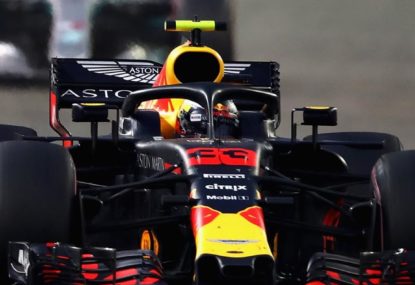Angry Carlos Sainz almost demands Oscar Piastri give back on-track spot after fierce battle
The Spanish driver claimed he was forced off the track while trying to overtake into fourth spot and wanted the McLaren driver to give…
Opinion

On the eve of the inevitable sealing of back-to-back Formula One world championships for Max Verstappen and an excellent victory for Sergio Perez despite a post-race investigation, the class-leading Red Bull Racing outfit has dominated the headlines over possible breaches of the cost cap.
There is no confirmation as yet, however rumours swirled through the Singapore Grand Prix weekend that both Red Bull and Aston Martin went over the $145 million budget cap on performance during the 2021 season – the year Verstappen triumphed in controversial circumstances over Lewis Hamilton in Abu Dhabi to win his maiden title.
“The FIA is currently finalising the assessment of the 2021 financial data submitted by all F1 teams,” read a statement from the governing body in Singapore. “Alleged breaches of the financial regulations, if any, will be dealt with according to the formal process set out in the regulations.”
Such discourse would’ve likely been leaked to the public, given how this sort of information would be strictly confidential. Though it has brought forward the ultimate of litmus tests for Formula One’s governing body in the FIA and its new president, Mohammed Ben Sulayem.
The purpose of the cost cap on performance was to slash the spending from bigger teams such as Red Bull, Mercedes and Ferrari, allowing the smaller, leaner outfits to be put on a level playing field in terms of what they’re permitted to spend on car performance.
It’s similar to a multitude of sporting codes globally that implement a salary cap to ensure the richest of franchises aren’t signing all the marquee players available. In theory, capping expenditure on car development was intended to replicate that.
If, indeed, any team has been in breach – whether it is regarded what the FIA state a ‘minor breach’, which equates to an overspend less than five per cent over the budget cap, or the more severe ‘major breach’, which is an overspend over five per cent of the cap – the offender must be punished accordingly.
Any sort of fine or financial penalty seems meaningless given the reason teams overspend is because their books are bustling. There needs to be deduction of championship points or even erasing results altogether, depending on how significant the breach is.

(Photo by Lars Baron/Getty Images)
The most famous example of cap penalties is the Melbourne Storm in NRL, where they were found to have been in breach of the league’s salary cap regulations for a period of five years. What resulted was a stripping of their 2007 and 2009 premierships, and having to play for no competition points in 2010.
Ben Sulayem and the FIA mustn’t hesitate to resort to these lengths in order to set an example, who continue to flaunt the boundaries of what is acceptable. Sure, it can be argued that as the pinnacle of motorsport they should be pushing every boundary, but when there are black and white regulations such as the cost cap? Just avoid it.
Ironically, Red Bull team principal Christian Horner was quoted by Motorsport.com having said “what we don’t want to do is end up playing a game of chicken. As to say, does he go to 4.9 per cent over? Do we go to 4.7 per cent over? And that would be the one upgrade that could be the differentiating factor of this world championship.”
While the wounds of Abu Dhabi 2021 still sting for many, including Mercedes and seven-time world champion Lewis Hamilton, Red Bull’s dragging into a potential breach of the cost cap only adds to the pain. Though if found guilty of even a minor overspend, which Horner equates to being that ‘differentiating factor”, it clearly warrants a punishment.
Yes, it sounds harsh and especially so for the drivers of these cars. Though returning to the Melbourne Storm example, their players still were forced to put their bodies on the line and turn up for 24 weeks and won 14 games in a 2010 season where they were automatically consigned to the bottom of the table.
The moral of the story then, is if there’s rules in place to prevent teams overspending, don’t do it.
There should be no games of chicken, or ‘this is Formula One and we’re entitled to do whatever we want’. Follow the rules, or face the consequences.
If the FIA find anyone guilty of cap breaches, then it is only the teams who must be disappointed in themselves if they gets results or entire championships taken away.